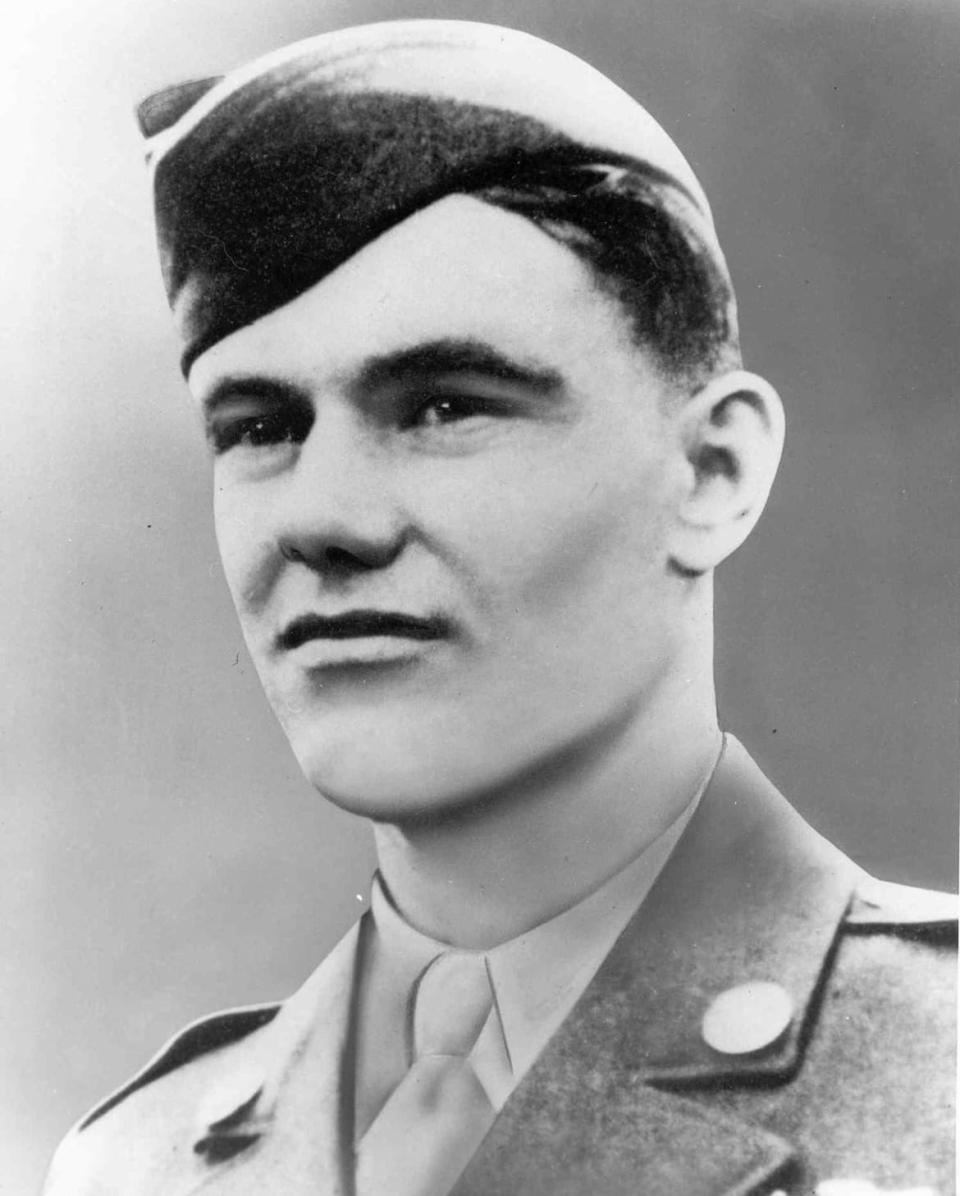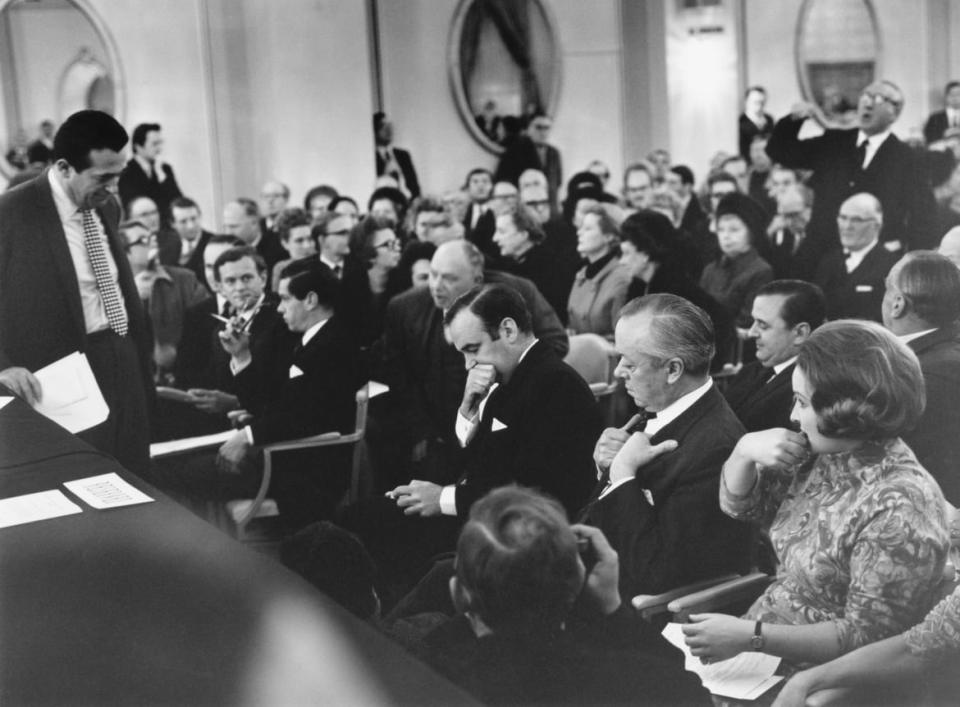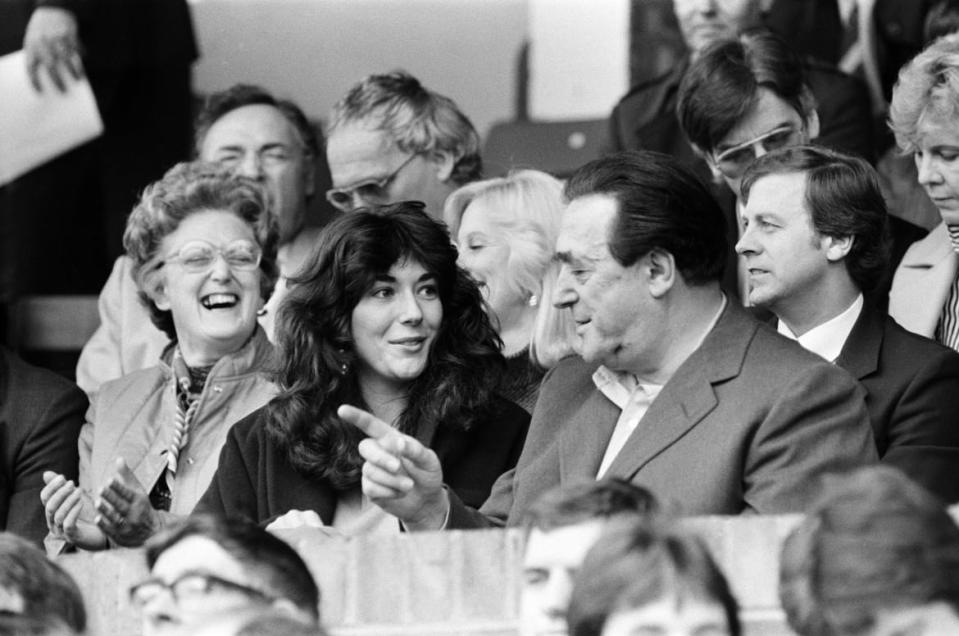Ghislaine Maxwell’s Father Was a Dark and Mysterious Figure, Just Like Jeffrey Epstein

Ghislaine Maxwell, the most elusive figure in the Jeffrey Epstein ménage, grew up in a family of dissemblers. In fact, the family business was built on dissembling.
No charges have been filed against 57-year-old Maxwell but she has been named in civil lawsuits alleging that she acted as a procurer of young women for Epstein. Their relationship has varied over the years from romantic to a more practical partnership in which she used her social connections to introduce Epstein to some notable figures, including Prince Andrew, the raciest member of Britain’s royal family.

Jeffrey Epstein and Ghislaine Maxwell attend an event at Cipriani Wall Street on March 15, 2005 in New York City.
Ghislaine’s father Robert Maxwell was one of the darkest and most mysterious men to appear in British public life.
Even his death remains a mystery. In November 1991 he disappeared from the deck of his yacht, the Lady Ghislaine, named for his youngest daughter, as it was anchored off the Canary Islands. (Like all Maxwell’s nine children Ghislane is French by birth—they were all delivered by the gynecologist sister of Maxwell’s wife Betty at a maternity home in Maisons Laffitte, a suburb of Paris.)

Robert Maxwell on his yacht Lady Ghislaine.
His naked body was found floating 15 miles away by a fisherman. Pathologists who performed post-mortem examinations disputed the cause of death. Two said he had fallen from the yacht after suffering a heart attack and drowned, a third said his heart condition had not been responsible, that he had fallen and drowned.
Throughout his whole life Maxwell concealed as much as he revealed. Outwardly he played the part of a charismatic businessman. But this performance was always based on an increasingly complicated web of companies with links that only he understood.
After his death it emerged that the Maxwell Communications Corporation owed money to 43 banks, with a total debt of more than $4 billion.
Seen through the eyes of forensic accountants it seemed like the life of a swindler and consummate con man. But the motivation behind it was more a self-created fantasy than greed. This was a pathology that I got to see myself, up close.
Everything You Need to Know About the Jeffrey Epstein Case
Maxwell first appeared as a small, flickering blob on my radar in 1963, in the first year of my leadership of an investigative reporting team at the London Sunday Times.
The paper’s science editor suggested that we take a dive into the records of a publishing company called the Pergamon Press, based in Oxford.
He explained that Pergamon published scientific journals. Pergamon’s list was originally built on an extraordinary coup planned by its owner, Maxwell.

Portrait photograph of United States Army Technician 5th Grade Robert Maxwell, June 20, 1942.
At the beginning of World War II a young Czech refugee, born Jan Ludvik Hoch, enlisted in the British Army as Private Robert Maxwell. By the end of the war he had fought from the Normandy beaches all the way to Berlin and risen to the rank of captain.
In Berlin Maxwell realized that a mother lode of scientific papers produced in Germany during the war had never been published in the West. While he was still in the British army and then in following years Maxwell arranged through German publishers to share the rights in these papers and he would publish them in English.
This was the West Berlin caught in the movie The Third Man, written by Graham Greene, in which Orson Welles is the unscrupulous Harry Lime making shady deals with shady people. Maxwell was not as cynical as Lime but he became adept at dealing in the hungry trading of the city where many of the deals were not in money but in bartered goods—in return for access to the scientific papers Maxwell could offer in exchange essentials that were in short supply.
Maxwell’s personality thrived in such a world where his fluency in languages and his cunning and wits were fully engaged. He made contacts in Eastern Europe, behind the Iron Curtain, that paid off later.
But London was a different challenge. There he felt like an outsider in a place where the old boy network still ran everything, particularly in book publishing. Very quickly, he got on the wrong side of them.
At the Sunday Times we learned enough to figure out that Maxwell had developed a new business that took him way beyond the potential of the German archives. Across the world science was splintering into many more specialized disciplines. Pergamon editors spotted each new field of work as it emerged and contacted its leaders. They were offered positions on an editorial board, a title was created and a new journal appeared.
There was no risk involved. The journals sold on subscriptions at a price that guaranteed profits. Some of the authors complained of being paid a pittance but that was normal in scientific journals.
There was no scandal to be exposed. The one thing that we did discover was why Maxwell was deeply disliked among London publishers. This was because in 1954 a book wholesaler he took over had quickly failed, leaving many publishers with large unsold stocks.
One of the publishers was the family firm of a future Tory prime minister, Harold Macmillan. “We have lost a fortune but my lawyers say we’ll never get our money back,” Macmillan complained. He was a forerunner of many others who did business with Maxwell, and he never forgot. But there was still no story for us.

Robert Maxwell stands talking to a police officer, with Big Ben rising above them, on his arrival at the Houses of Parliament to take his seat as MP for Buckingham, London, England, Great Britain, in October 1964.
A year later, in 1964, Maxwell was elected to parliament, part of a resurgent Labour Party after Macmillan had resigned from office following the Profumo scandal. Harold Wilson, the Labour prime minister, was apparently well informed about Maxwell’s background. He called him “the bouncing Czech.”
I finally met Maxwell in person in 1967.
A London court stopped the publication of the gay classic Last Exit to Brooklyn by Hubert Selby. Most London publishers decried the move as a relapse into censorship. But Maxwell supported the ban.
I was then a producer of David Frost’s live interview show and we invited Maxwell to defend his position alongside the book’s publisher, John Calder.
Calder got the better of the encounter. He accused Maxwell of supporting censorship. Maxwell said he was against censorship but then erupted like a Victorian prude: “I’ve read this book and I consider it muck and filth of the worst kind.” The studio audience greeted this with derision.
Maxwell was unfazed. In the Green Room he was an imposing presence: a bear-like hulk, a booming baritone, Bela Lugosi eyebrows and a bone-crushing handshake. He bore no grudge against Frost. In fact, he had spotted someone he thought might be useful to him.
He decided that Frost might help him to achieve his ultimate ambition, to get into the television business.
In a series of meetings with Frost, which I attended, it became clear that Maxwell was in an obsessive pursuit of his own Great White Whale, in the form of the Australian Rupert Murdoch.

Rival publishers Robert Maxwell (standing, left) and Rupert Murdoch (center) await a vote on their respective bids for the News Of The World newspaper, during a shareholders' meeting at the Connaught Rooms, London, January 2, 1969. The shareholders are to vote on whether to accept a share exchange deal with Murdoch's company, News Ltd, or approve a 34 million pound takeover bid by Pergamon Press, owned by Maxwell. The vote later went in favor of Murdoch's offer.
A bitter battle was about to erupt between the two men for control of Britiain's biggest-selling newspaper, the weekly News of the World. Murdoch won, and then outbid Maxwell to add a moribund daily, The Sun, to his Fleet Street stable, relaunching it as a racy tabloid in late 1969.
Murdoch made it clear that he intended to move next into television and Maxwell intended to beat him to it. When the government opened up a number of commercial television franchises Maxwell tried to enlist Frost’s help in bidding for one. Frost refused.
Murdoch launched his television empire without needing to win a franchise. He spotted the potential of satellite-beamed broadcasting and launched Sky in Europe and, of course, ultimately Fox News. Maxwell never got into television.
A while after those meetings Maxwell read a long piece I wrote about the shortcomings, as I saw them, of the British newspaper industry. He invited me and my wife to his country mansion near Oxford—“to further explore my ideas” he said.
It didn’t turn out to be a very private experience. Other house guests included several members of the Labour government. I found that they were as leery as I was at the prospect of Maxwell as a newspaper proprietor, even if he supported the party. They liked his company and his wine cellar but to them Maxwell remained the bouncing Czech.
And when I did talk to him about my ideas it was apparent that he would use a newspaper as he saw fit, with no respect for editorial independence.
But one of Maxwell’s stock responses was to treat an opposing view as something that might be reversed if he persisted. After that meeting he twice offered me a job as an editor. Each time I refused and in one of those cases I advised him against buying the paper. I knew he would ignore it.

Robert Maxwell at a press conference in London after it was announced that he had bought the Daily Mirror and its sister newspapers for 113.4 million.
In Maxwell’s head the contest with Murdoch never ceased. He did acquire newspapers, in Scotland and in London, where he bought a legendary tabloid, the Daily Mirror. And he followed Murdoch across the Atlantic after he bought the New York Post, by buying the New York Daily News.
But he had none of Murdoch’s editorial instincts. And the papers were financially hollowed-out as Maxwell juggled funds between the 400 private companies that he ran on the basis that nobody else, not even the two sons, Kevin and Ian, who were closest to him, would know how seriously they were building up debt.
After his death it emerged that Maxwell had looted hundreds of millions from the Daily Mirror pension fund. Eventually, with the help of the British government, the pensioners got half of what they were due.
Inside Jeffrey Epstein’s Creepy Parties With Prince Andrew
There was a kind of grandiose dementia behind Maxwell’s empire. It never approached the omnipotent media power he craved and that Murdoch had achieved. He had the paranoia of someone who felt that he could never trust anyone around him. He had the Daily Mirror executive floor bugged so that he knew what his top managers were saying about him. Although many banks loaned him money he felt that British bankers in particular held their noses while taking his business.

Ian Maxwell (left) looks to his brother Kevin outside the High Court, London, after a judge ruled that Kevin should not stand trial for a second time on charges relating to the collapse of his disgraced father Robert's media empire.
Ian and Kevin Maxwell were acquitted on charges of conspiracy to defraud by a jury in 1996. Kevin was declared bankrupt with debts of $600 million.
There are people who believe that Maxwell’s departure from the Lady Ghislaine was neither accidental nor voluntary. It was easy to conjure conspiracy theories—his life was in some respects like a John le Carré villain’s. His connections embraced spooks in London, Tel Aviv and Moscow. But the clearest motive was the simplest: The game was up. There was no way out of the pit of debt that he had created.

Robert Maxwell and his daughter Ghislaine watch the Oxford v Brighton football match, October 13, 1984.
Ghislaine Maxwell is variously described as a “socialite” and, more quaintly, as a member of the plutocratic jet set. Her father was never in any set and never had any interest in a frivolous life. In that respect, at least, she is not a chip off the old block. Her celebrity (or notoriety) does raise a question familiar to all old Maxwell watchers: Where does all the loot come from? The same question is often asked of Epstein.
Get our top stories in your inbox every day. Sign up now!
Daily Beast Membership: Beast Inside goes deeper on the stories that matter to you. Learn more.

